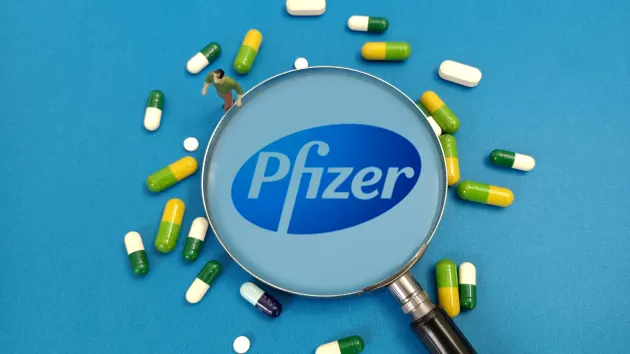Pfizer is attempting to get a piece of the emerging weight loss medication market as its Covid gains disappear.
Future data on Pfizer’s experimental obesity medication, danuglipron, is expected to be significant in determining the company’s ability to compete with Eli Lilly and Novo Nordisk, the market leaders.
Some companies, like Novo Nordisk with Wegovy and Ozempic and Eli Lilly with Mounjaro, contributed to the weight loss drug industry’s recent boom with their weekly injections for diabetes and obesity. They are currently racing to create their own medications to treat diabetes and obesity.
By the end of the year, investors are waiting on Pfizer to release phase two trial results on its twice-daily pill in obese patients without diabetes. Their goal is for the medication to result in weight loss on par with an Eli Lilly once-daily pill. Investors are also anticipating the release of trial results on Pfizer’s once-daily danuglipron, which is thought to be a more competitive version of the medication, early in the following year.
Pfizer sees a significant opportunity in this market as it attempts to reverse a 40% decline in share price this year and recover from the sharp decline in demand for its Covid products.
The market for GLP-1s, a class of obesity and diabetes medications that mimic a gut hormone to suppress appetite, may eventually reach $90 billion, according to CEO Albert Bourla’s January remarks. The company hopes to take $10 billion of that market share with an oral treatment.
Investors’ confidence in Pfizer’s prospects in the weight loss medication market has dwindled since the company discontinued its once-daily experimental pill in June, citing increased liver enzyme levels in users. Due to its less convenience compared to a once-daily treatment, Wall Street is less enthusiastic about Pfizer’s twice-daily danuglipron.
Positive trial results could incite the same excitement for Pfizer that has raised Novo Nordisk and Eli Lilly’s stock prices this year.
Cantor Fitzgerald analyst Louise Chen told, “If Pfizer’s data is positive, then I think people might be able to look beyond all this Covid overhang.”
A pill to reduce weight might be beneficial for all three businesses. In general, oral medications are more convenient for patients to take and for doctors to prescribe than injections. As the demand for these drugs rises, pills may also be able to help ease the supply shortages that many of their injectable counterparts are experiencing.
For efficacy, Eli Lilly’s pill is the standard.
Several analysts have stated that Pfizer’s twice-daily pill needs to be roughly as effective as Eli Lilly’s once-daily pill in order to be competitive, prior to the release of the phase two trial data. Chen told that this translates to a minimum of 14% to 15% weight loss.
In October, David Risinger, an analyst at Leerink Securities, stated that Pfizer’s danuglipron must demonstrate weight loss in the “mid-teens” percentage range in order to be compared favorably to Eli Lilly’s orforglipron tablet.
According to the company’s phase two trial results, patients who were obese or overweight and took 45 milligrams of Eli Lilly’s pill once daily lost up to 14.7% of their body weight, or 34 pounds, after 36 weeks.
These outcomes, which were obtained over a shorter trial period, seem congruent with the weight loss brought about by a high-dose oral version of Novo Nordisk’s semaglutide, the active component used in Ozempic and Wegovy.
Based on phase three clinical trial results published in June, overweight or obese patients who took 50 milligrams of Novo Nordisk’s drug once daily experienced an average weight loss of 15.1% after 68 weeks.
Notably, Rybelsus, an oral low-dose form of semaglutide, is already marketed by Novo Nordisk for the management of Type 2 diabetes.
The effects of taking danuglipron twice daily will be seen over a longer time span than in Pfizer’s earlier studies of the medication, according to the company’s upcoming phase two trial data. After 26 or 32 weeks at various dosage levels, the study looked at the treatment’s impact on weight loss in over 600 obese adults.
Patients with Type 2 diabetes who took a 120-milligram dose of danuglipron twice daily lost about 10 pounds on average after 16 weeks in an earlier midstage trial.
Another midstage trial discovered that after 12 weeks, diabetic patients taking a 200-milligram dose of danuglipron twice a day lost an average of almost 12 pounds, or 5.8% of their body weight.
Investors are still hoping for a once-daily release.
Many investors will still be eager to see the efficacy and safety profile of a once-daily version next year, even if Pfizer’s upcoming data is encouraging.
According to a research note published in June by Wells Fargo analyst Mohit Bansal, doctors typically prefer once-daily pills over twice-daily medications.
Additionally, medical professionals previously told that when a patient has to take a medication twice, they frequently forget to do so.
Concerns regarding the twice-daily version of danuglipron’s possible increased rate of gastrointestinal side effects, like nausea and vomiting, may also be allayed by a once-daily dosage.





